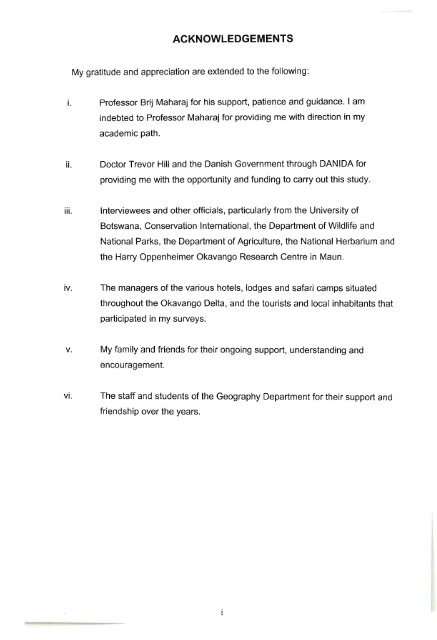the role of tourism in natural resource management in the okavango ...
the role of tourism in natural resource management in the okavango ... the role of tourism in natural resource management in the okavango ...
» ¥GC ACKNOWLEDGEMENTS My gratitude and appreciation are extended to the following: i. Professor Brij Maharaj for his support, patience and guidance. I am indebted to Professor Maharaj for providing me with direction in my academic path. ii. Doctor Trevor Hill and the Danish Government through DANIDA for providing me with the opportunity and funding to carry out this study. iii. Interviewees and other officials, particularly from the University of Botswana, Conservation International, the Department of Wildlife and National Parks, the Department of Agriculture, the National Herbarium and the Harry Oppenheimer Okavango Research Centre in Maun. iv. The managers of the various hotels, lodges and safari camps situated throughout the Okavango Delta, and the tourists and local inhabitants that participated in my surveys. v. My family and friends for their ongoing support, understanding and encouragement. vi. The staff and students of the Geography Department for their support and . friendship over the years.
;;;4 ABSTRACT In recent years the use of tourism as a development strategy by Third World governments has increased, resulting in the intersection of international tourism and local resource utilisation patterns. The aim of this thesis is to critically assess the impact of tourism in the utilisation and management of natural resources in the Okavango Delta in Botswana. More specifically, the study appraises the current state of tourism and natural resource utilisation and management in the Okavango Delta; assesses the past and present forms of resource utilisation practised by the local inhabitants scattered throughout the Delta area; focuses on the implementation of government policy regarding resource use; highlights past and present relationships between tourism and resource utilisation; and examines the impact of tourism on the areas resources, environment and local inhabitants. Research has shown that the Okavango Delta, which is Botswana's primary tourism area, is faced with a number of social, economic and environmental challenges. These include extreme levels of poverty, especially in the rural areas; lack of infrastructure; competition over land and resources; growing regional inequality; social degradation; increased imports leading to foreign exchange leakages; changes in subsistence strategies and increased 'rural-urban' .migration; and the loss of control of the region by the local population to the global tourism system. The Okavango Delta is in the process of undergoing a change from traditional, rural, subsistence economies and livelihoods to capitalist, commercial-driven economic structures. In the Okavango Delta, as in many places around the world, people are in the process of being integrated into national level political, social and economic institutions, both within and outside of their control. The creation of employment for the local population, the sustainable use of the Delta and its resources, the development of the local agricultural industry, the continued growth of the tourism industry, and striking a balance between the conservation/preservation of the Okavango and meeting the water requirement needs of Angola, Namibia, and Botswana's growing populations are amongst the key concerns present in the area. 11
- Page 1: ;q::a THE ROLE OF TOURISM IN NATURA
- Page 5 and 6: TABLE OF CONTENTS CHAPTER ONE: INTR
- Page 7 and 8: 4.4 4.5 4.6 4.7 4.8 4.8.1 4.8.2 4.8
- Page 9 and 10: 5.4.1.6 Batawana and Natural Resour
- Page 11 and 12: CHAPTER SEVEN: NATURAL RESOURCE UTI
- Page 13 and 14: 8.2.1 Migration in the Okavango Del
- Page 15 and 16: REFERENCES APPENDICES XIV 417 459
- Page 17 and 18: Table 6.15: Room and Bed Occupancy
- Page 19 and 20: LIST OF FIGURES Figure 2.1: Study o
- Page 21 and 22: ACP ADP AE10 AIDS ALDEP ARAP BAMB B
- Page 23: SPSS STMT TGLP UB UNDP UNEP UNRISD
- Page 26 and 27: Empirical evidence, however, does n
- Page 28 and 29: norms of its people. To date, the g
- Page 30 and 31: numbers (Appendix One). Investigati
- Page 32 and 33: 4. Establish the extent of natural
- Page 34 and 35: detailed in chapter five. The insti
- Page 36 and 37: destinations, concentrating on its
- Page 38 and 39: serious academic consideration. The
- Page 40 and 41: Figure 2.1: Study of Tourism and Ch
- Page 42 and 43: management strategies are implement
- Page 44 and 45: Tourism should thus be regarded as
- Page 46 and 47: exchange, investment, income and em
- Page 48 and 49: problem. He states that it is time
- Page 50 and 51: The first assumption is largely bas
» ¥GC<br />
ACKNOWLEDGEMENTS<br />
My gratitude and appreciation are extended to <strong>the</strong> follow<strong>in</strong>g:<br />
i. Pr<strong>of</strong>essor Brij Maharaj for his support, patience and guidance. I am<br />
<strong>in</strong>debted to Pr<strong>of</strong>essor Maharaj for provid<strong>in</strong>g me with direction <strong>in</strong> my<br />
academic path.<br />
ii. Doctor Trevor Hill and <strong>the</strong> Danish Government through DANIDA for<br />
provid<strong>in</strong>g me with <strong>the</strong> opportunity and fund<strong>in</strong>g to carry out this study.<br />
iii. Interviewees and o<strong>the</strong>r <strong>of</strong>ficials, particularly from <strong>the</strong> University <strong>of</strong><br />
Botswana, Conservation International, <strong>the</strong> Department <strong>of</strong> Wildlife and<br />
National Parks, <strong>the</strong> Department <strong>of</strong> Agriculture, <strong>the</strong> National Herbarium and<br />
<strong>the</strong> Harry Oppenheimer Okavango Research Centre <strong>in</strong> Maun.<br />
iv. The managers <strong>of</strong> <strong>the</strong> various hotels, lodges and safari camps situated<br />
throughout <strong>the</strong> Okavango Delta, and <strong>the</strong> tourists and local <strong>in</strong>habitants that<br />
participated <strong>in</strong> my surveys.<br />
v. My family and friends for <strong>the</strong>ir ongo<strong>in</strong>g support, understand<strong>in</strong>g and<br />
encouragement.<br />
vi. The staff and students <strong>of</strong> <strong>the</strong> Geography Department for <strong>the</strong>ir support and .<br />
friendship over <strong>the</strong> years.



